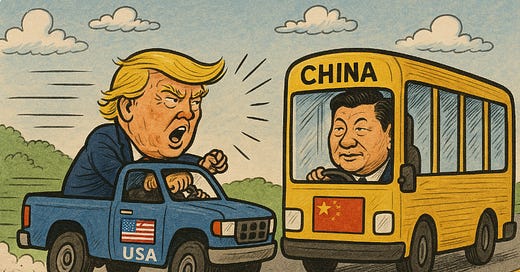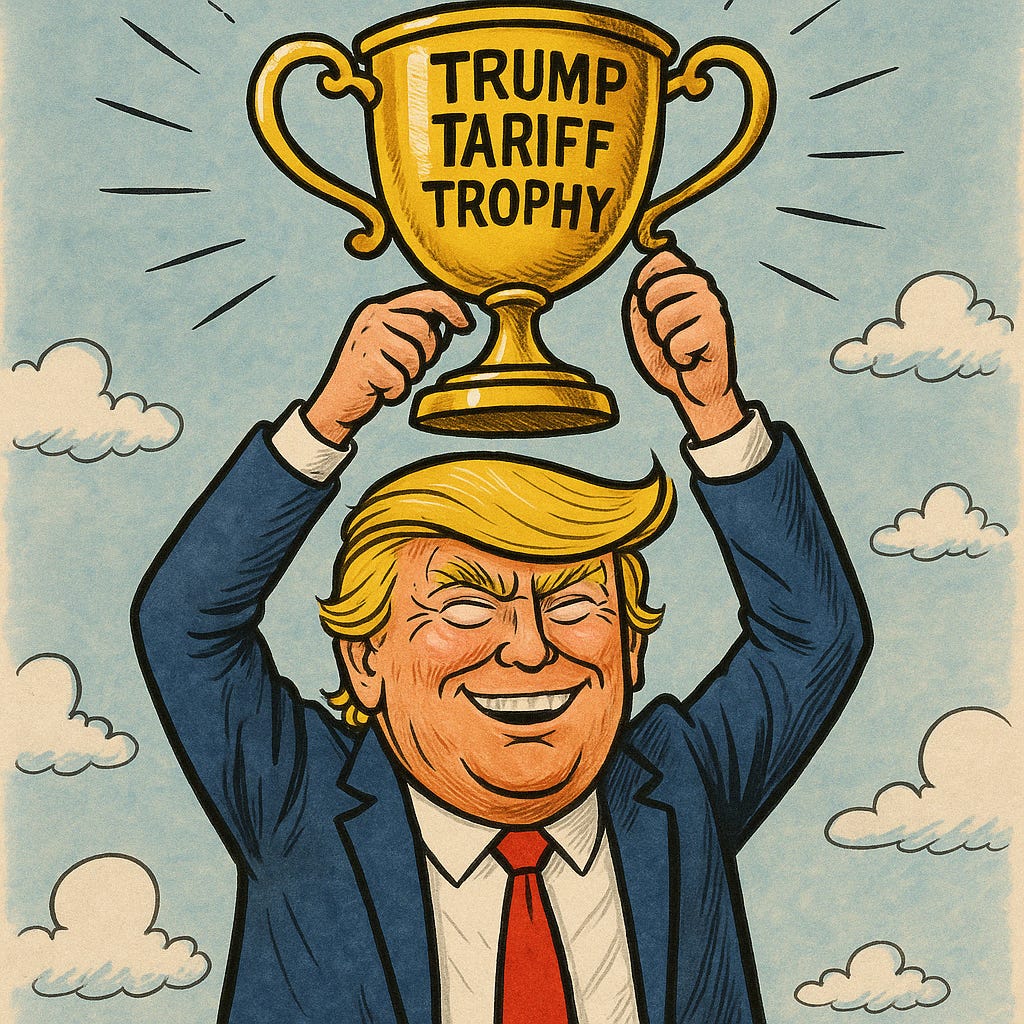Playing out Trump's game of tariff chicken...
There's one excellent outcome, one mediocre one, and a bunch of lousy ones.
Hello, everyone! Welcome! There are many more of you than there were yesterday. So if you want to catch up on our trade-war discussion, it’s here. Regardless, thank you for subscribing to Regenerator! We’re for people who want to build a better future. We analyze the biggest questions in tech, business, markets, and policy.
As I explained yesterday, by far the smartest next move Pres Trump can make in his trade war — for himself, America, and the Americans he says he wants to help — is to declare victory, postpone all the tariffs, and move on.
Pres Trump is not constrained by facts, so he can do this regardless of whether China has actually expressed a willingness to talk.
If Pres Trump does that, he’ll be a hero.
The stock market will gap up ~15%, and interest rates will drop, as confidence in America’s decision-making returns. Pres Trump can take credit for that and for having the balls to address the China trade imbalance more aggressively than other Presidents and world leaders. (A fact, whether or not you believe it needs to be addressed.) Inflation will remain contained, and a tariff-induced recession will become less likely. And Pres Trump can proudly place a giant Trump Tariff Trophy in the Oval Office and regale visitors with stories about the great deals he’s getting America.
That move would be the best for everyone — Americans, American companies, China, and the world. Because the truth is that, although there is indeed a trade imbalance with China, our modern global economy is and will remain highly integrated, whether or not the U.S. participates. (FWIW, I see this as a good thing, not a bad thing, which I guess makes me a patsy globalist). And suddenly “decoupling” two major economies like China and the U.S. is devastating for all involved.
But will Pres Trump really do that — declare victory and postpone the war?
I’d like to think so. It is so obviously the best move for him and the country.
But I fear that he won’t.
Pres Trump has loved tariffs so fervently for so long — and seems so sure that trade deficits mean America is “getting ripped off” (they don’t!) — that my guess is that, even after deal-talks start in earnest, we’ll be stuck with a tariff regime that is worse than the Smoot-Hawley disaster that exacerbated the Great Depression.
This will slow U.S. economic growth — not just now, but in the future. It will also increase prices, reduce product selection, and hurt American companies. And, absent a comprehensive “re-shoring” plan — which will need to include targeted investments in subsidies, vocational training, and advanced manufacturing — it won’t rebuild American manufacturing, especially in the industries of the past.
Global investors, it seems, are trending toward the same conclusion. After a relief-rally last week, the stock market is resuming its decline, and the dollar and the bond market suggest that investors are losing faith in America’s discipline and sanity.
So here’s what I think will happen:
I hope — and still expect — that Pres Trump will soon say that China wants to talk and dial the China tariffs back to, say, the ~10% that seems to be his baseline for the world. Or, alternatively, he will exempt so many categories of goods from the China tariffs that the current 145% trade-stopper will be rendered moot.
The liberal media will howl that Pres Trump “caved” or “blinked” but it won’t matter because he’ll dismiss them as nasty dishonest Trump haters who don’t know the first thing about negotiating, and most Americans will be so relieved that they won’t care.
Then, over the next few months, I think Pres Trump will announce “great deals” with countries like Japan that might be modestly more favorable than the relationships the U.S. had before “Liberation Day.” And I think there will be talks of some sort with China that might, eventually, yield a slightly better headline arrangement but in which the devil will be in the details. Unless we’re willing to invest literally years in these talks, the improvement really will likely be just minor. Trade deals are complicated. They take a long time to negotiate and implement. And China is not likely to just roll over.
And, in the meantime, Pres Trump will rave about great how the talks are going and/or threaten to re-impose punitive tariffs on countries he is unhappy with. He’ll also likely keep a baseline tariff rate of 5%-10% for almost everyone — which he’ll present as incremental tax revenue paid by other countries that will pay for a tax cut in the U.S. And life in our integrated global economy will go on, albeit with slower growth and maybe a recession and a healthy slug of inflation for U.S. consumers, who will actually pay for most of the tariffs.
Hopefully, as the talks continue and the deals get done, our companies will again be able to to plan and make supply-chain investment decisions with some degree of confidence. (Otherwise, they’ll be paralyzed). And then, in four years, if the U.S. has another President, we’ll revisit the wisdom and effectiveness of tariffs vs. freer trade and go from there.
That’s my guess.
Here are some other possible futures:
Pres Trump might have — and implement — a comprehensive global trade and U.S. re-industrialization plan that goes beyond tariffs. This is the “4D chess” theory. If it’s true, hallelujah! Go, Pres Trump! (One caveat, though. Rebuilding U.S. manufacturing will take decades.)
Pres Trump might singlehandedly cause a financial crisis. We almost had one last week. And we’re not out of the woods. Interest rates are rising, and the dollar is crashing, as global investors (including U.S. investors) dump America for safer and more reliable countries.
China might suddenly cave and come groveling and give Pres Trump a bona fide “great deal.” Pres Trump will likely say this is what China is doing no matter what China does. But China holds more cards than the relative import/export figures suggest. And Pres Xi doesn’t want to look weak, either.
Pres Trump might just stick with the 145% tariffs forever and “decouple” China and the U.S. overnight. Without enormous loopholes, this would cause immense pain for the U.S. economy and consumers — and, yes, China. It would eliminate a huge market for American companies (even restricted, China’s big). It would also likely lead to the rest of the world further globalizing, innovating, and integrating with China while the U.S. watches alone from the sidelines. And, in my opinion, by reducing our interdependency, it would likely increase the risk that China will become a hot military enemy and that missiles will eventually start flying. None of that’s good, so let’s hope it’s very unlikely.
Thank you for reading and subscribing to Regenerator! My email is hblodget@regenerator1.com. My mind and inbox are open. I hope you have an excellent Easter weekend!
Really… all he has to do is claim the win.







Henry, great to have your voice back in the mix of things! I hope you're right, but so far, the rollout of tariffs has been so haphazard that it suggests two things: 1) there is no actual plan (no 4D chess) and Trump is winging things and 2) unlike the first Trump Administration, there's no strong voices of reason that can push him off of his very worst impulses. He seemed surprised that his much higher than expected and poorly conceived tariff structure was causing the bond markets to go to chaos, which again suggests that no one on his team gamed out the possible consequences of his actions.
@Henry Blodget you turned off comments in your other post. but sexual harassment isn’t tongue in cheek. trying to explore AI as a phenomenon is outdated you’re going to get a summary of a bunch of slop and occasional hallucinations. very weird to hit on your AI employee. maybe get therapy dude>?